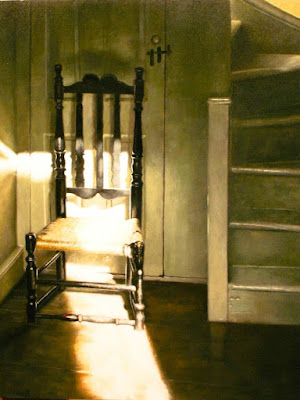“National Dog Day” yesterday, got me thinking about Ohio the
Wonder Dog…
Carla and I spent our first year together on 35 acres of remote woods, just outside of Athens, Ohio where we were in school at Ohio University. Home was a rectangular pole house that violated every known building code. One afternoon Carla decided that it would be a good idea to adopt a free puppy that another student was offering to a crowd sitting on the steps of the Student Union building. A Shepherd/Lab mix about 5 weeks old, not fully weaned from her mother. Baby “Ohio” trembled uncontrollably on shaky legs when she lapped her warm milk. She was so unsteady and new.
Fast forward five years and “Ohio” was the shire reeve of our five-acre wood in Loudoun Co. Virginia, just outside of Washington, DC, where I worked. The log cabin built in 1729 on land that was part of a grant from Lord Fairfax was attached to a summer house circa 1852. Ohio had her own house on the front porch. She preferred to live outside, even on the coldest nights, keeping busy as she took her guard duties very seriously, patrolling the perimeter and controlling the varmint population in the surrounding woods. For several years she ate no commercial dog food, just too stuffed with rabbit, possum, squirrel, and raccoon to have another bite when offered, but thanks anyway. Although we had no neighbors within hearing distance, nor outside lights, even on the darkest nights I knew that she was watching, alert and ready to challenge any interlopers, animal or human that were foolish enough to trespass. In the morning, before I went to work, I put on dirty gloves to pick the yard clean of skeletal remains from her latest dinner, tossing them up into the tree of death.
As I went off to work, it was with complete confidence that Carla, Ruth, and baby Hannah were safe from trespassers and boogie men. Ohio made sure of it. While Carla and the girls played and slept on the inside, Ohio protected the nest from the outside.
Although she was never heavy, no more than 70 pounds tops, she had a mouth like a barracuda and the heart of a Wolverine. If Carla or the girls were threatened in any way, she would give her life to put a stop to that shit. On warm afternoons though, Ohio would lie in the front yard with her very best friend, Ruth, and doze in the sun just a bit while Ruth quietly read stories to her. Total peace and calm for both of them.
But god help the UPS man or a new meter reader who didn’t know that he should always bring his binoculars to read the meter if he expected to go back to his own home at night with both legs still attached and working.
That good dog lived to be 17, pretty old for a big dog. The day I had her put down some 25 years ago, remains, the saddest day of my life.
I wrote of her back in the day:
Carla and I spent our first year together on 35 acres of remote woods, just outside of Athens, Ohio where we were in school at Ohio University. Home was a rectangular pole house that violated every known building code. One afternoon Carla decided that it would be a good idea to adopt a free puppy that another student was offering to a crowd sitting on the steps of the Student Union building. A Shepherd/Lab mix about 5 weeks old, not fully weaned from her mother. Baby “Ohio” trembled uncontrollably on shaky legs when she lapped her warm milk. She was so unsteady and new.
Fast forward five years and “Ohio” was the shire reeve of our five-acre wood in Loudoun Co. Virginia, just outside of Washington, DC, where I worked. The log cabin built in 1729 on land that was part of a grant from Lord Fairfax was attached to a summer house circa 1852. Ohio had her own house on the front porch. She preferred to live outside, even on the coldest nights, keeping busy as she took her guard duties very seriously, patrolling the perimeter and controlling the varmint population in the surrounding woods. For several years she ate no commercial dog food, just too stuffed with rabbit, possum, squirrel, and raccoon to have another bite when offered, but thanks anyway. Although we had no neighbors within hearing distance, nor outside lights, even on the darkest nights I knew that she was watching, alert and ready to challenge any interlopers, animal or human that were foolish enough to trespass. In the morning, before I went to work, I put on dirty gloves to pick the yard clean of skeletal remains from her latest dinner, tossing them up into the tree of death.
As I went off to work, it was with complete confidence that Carla, Ruth, and baby Hannah were safe from trespassers and boogie men. Ohio made sure of it. While Carla and the girls played and slept on the inside, Ohio protected the nest from the outside.
Although she was never heavy, no more than 70 pounds tops, she had a mouth like a barracuda and the heart of a Wolverine. If Carla or the girls were threatened in any way, she would give her life to put a stop to that shit. On warm afternoons though, Ohio would lie in the front yard with her very best friend, Ruth, and doze in the sun just a bit while Ruth quietly read stories to her. Total peace and calm for both of them.
But god help the UPS man or a new meter reader who didn’t know that he should always bring his binoculars to read the meter if he expected to go back to his own home at night with both legs still attached and working.
That good dog lived to be 17, pretty old for a big dog. The day I had her put down some 25 years ago, remains, the saddest day of my life.
I wrote of her back in the day:
Ohio is feeling old but still hunts on bright nights.
I collected her prizes and hung them in the tree of death.
Her larder swings with stiff winds and drips with memories of once plump
Opossum civilians who should have chosen the road not taken.
Still needle-toothed skulls leer down at Ohio with a mocking sass.
No knowledge that it’s a little late for such bravado.





